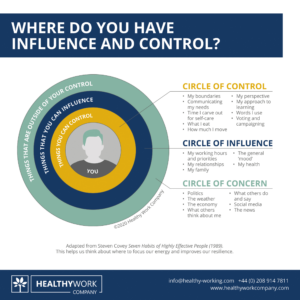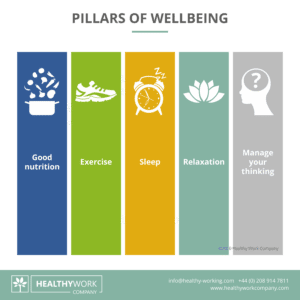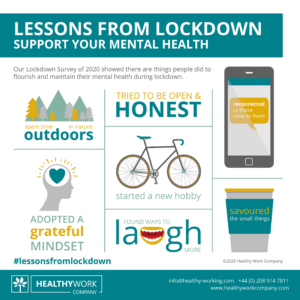I am an irascible, impatient, ambitious perfectionist with tendencies to workaholism. I am also a wellbeing professional.
I work with organisations to look at the systemic and cultural piece they need to be aware of in order to create a team who are well and happy – and therefore in the position to do their best for your business; and I founded Healthy Work Company to provide training for managers and individuals on creating good wellbeing in their teams and individually.
Like many business owners I have had to take a deep breath over the last year on many occasions. I am responsible for salaries and livings including my own and we have been all been through corona roller coaster. There is nothing like fearing for your own living to create stress – stress which it is very difficult not to take out on those around you including your staff and contractors.
Is planning for happiness just sad?
Good wellbeing is subjective. It can be more than just in the moment happiness (known as subjective wellbeing or hedonic happiness) but may be about feeling your life has meaning and purpose – about long term life satisfaction. Long term life satisfaction can come through getting through the hard stuff and coming out a better person. It can come through feeling you make a contribution as a person.
In the past we have stood and trained groups of people who have felt that it was a bit sad if you had to have a plan for your happiness – that in a sense it was less authentic if you had tried to manufacture it. That it should somehow just come intuitively. I think the pandemic has taught us differently. If we don’t learn how to manage our own stress, know ourselves well enough to understand what make us happy, we can struggle and go under – taking those dear to us with us.
As a manager, business owner, supervisor, black hat – whatever your role – you have a huge impact on those around you – and yes if you are at the top you create culture, but try working for an un self-aware mini-martinet supervisor, driven through ego and you know just what an impact that has on your life.
Resilience grows through challenge
You may have been brought up to believe “whatever doesn’t kill you makes you stronger” and whilst it is true that some traumas are too much for human beings to bear, resilience is indeed a human quality we all possess which grows when we learn to adapt through challenge. So, when we have faced the kind of problems we are and have been facing, one way to relate to those is – what have I learnt?
Indeed, what have we learnt through facing this pandemic?
Self-knowledge
“There is no single recipe for human happiness which can be copied” Csikszentmihalyi.
The more we understand ourselves, the more fully we can live and be happy. Whilst my perfectionist loving workaholism may have been of great assistance on occasion, they are not always the best qualities for maintaining my wellbeing and that of those around me! Being aware of them helps me curb the worst of them. When irritation at a mistake someone made in my team comes up, I can remind myself – no one is perfect (not even me!) and that is just my fear of failure coming up. Did they do their best? Yes. Will I be OK? Yes. And breathe…..
Yes, there are certain things which research shows are really good interventions to improve your wellbeing, but they may not all be for you. I don’t yet journal, practice meditation or run – in spite of them being excellent evidence-based interventions for good health. I do, however, cook from scratch, go out for a brisk walk in the fresh air every day and get to bed early every night. I do my best to be kind. I consciously appreciate everything in my life. I laugh a lot. I connect authentically with people and I reach out to people to support me when I am not doing well.
Managing our stress response system
When we get into the fright flight or freeze impulse, when we feel that panic coming over us, that is our prehistoric stress response system coming into play which was built to help us deal with a sabre tooth tiger. Short term, it deprives us of our ability to think straight or to be our best self (as it cuts off access to our rational brain/pre-frontal cortex). Long term if we are constantly in a state of stress and overwhelm, we will make ourselves physically or mentally ill – burnout, anxiety, depression, stomach problems, musculoskeletal issues.
Dealing with short term stress
When we feel that panic overtaking us we recommend taking a break from the situation if at all possible before we get ourselves into more trouble. This might also include breathing (we use box breathing – where you count in for four, wait for four, count out for four and wait for four all whilst drawing a box in the air). Labelling what you are feeling is also helpful (sounds a bit geeky but forces your rational brain to work!) so rather than “I feel bad” you might think hmm, am I feeling hatred or disgust or frustration or irritation….. ? Once your pre-frontal cortex is back in play you can start to rationalise again . Is this the end of the world? Is this how I want to behave? Am I OK right now…. (roof over my head, food in the fridge etc).
Dealing with longer term stress
The key here is recognising what is going on. Most of us don’t see it until we are already in the thick of overwhelm and about to make ourselves ill. You are looking for patterns such as feeling upset or sad a lot, constantly reaching for the things which are bad for you, being triggered often by small things and being plagued by physical illnesses.
When we recognise that is what we are dealing with, the key is to write our stressors down or talk them through with someone. When we know what we are dealing with, we can think of strategies and coping mechanisms. My personal favourite is the circles of influence control and concern. Where does my stressor sit? Is it something I can control or can I only influence it? Is it absolutely outside of my control and I should not waste my energy on it (e.g. politics. the economy, the weather)?

Building our coping mechanisms
There are certain factors (we call them the key protective factors) which are just the basics of looking after our mental and physical health – which, if we practice them will give us a larger capacity to cope with stressors. If I have slept well, eaten the right things, had some exercise and rest and am aware my negative thoughts are not the truth – I will be able to cope with a far bigger range of stressors and far more of them.

Over and above these key protective factors there are a huge range of interventions which are scientifically demonstrated to help us thrive (and improve our resilience). Some have greater research behind them than others but here are three of the big ones
Human connections
We are hard wired to connect with each other. Even the most introverted among us will do better with support from people close. Making an effort to continue to call, see, laugh and authentically let people know how we are doing is a huge key right now. You may be able to support someone else, or be supported yourself. Even those fleeing chats with strangers research shows give us a lift.
Gratitude
Consciously recognising what we have to be grateful for literally changes the wiring in our brain to notice those things more and generally be happier
Mindfulness
Mindfulness is just about being in the here and now – and there is a huge amount of research to say it improves the quality of your life vastly from cognition to stress to happiness.
The picture below shows those things respondents to our lockdown survey in 2020 were doing wich supported their mental health

Finally
When human beings are worried about survival their stress response system kicks in and as we know, they are not their best selves at those times. It is hard to be happy when you are worried about your rent, your food and your basic survival. The construction industry in the UK is renowned for having late payment. If you are in a position to influence this, as a minimum if you want to look after your team and contractor’s mental health – pay them on time.
Three Top tips for getting through tough times
Self-knowledge – know what makes you happy and better able to cope and be ruthless about making time for those things. Know what you have a tendency to do which undermines you.
Connections – make time to talk to friends and family and be honest about how you feel. We all need each other.
Look after yourself – make sure you do the basics (sleep, exercise, nutrition, rest and managing your thinking). This will ensure that you have greater capacity to deal with those stressors
Healthy Work Company provides consultancy and training support for wellbeing. If you want us to do a talk for your SMT, train your managers and supervisors in ensuring their teams wellbeing, or run sessions on resilience please contact info@healthy-working.com.
